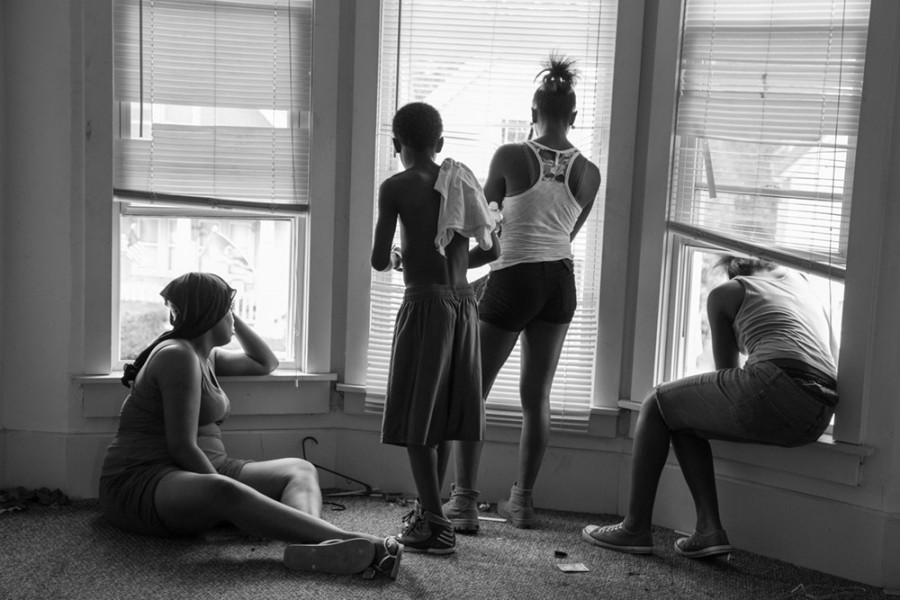
Locked Out
Matthew Desmond’s best-selling book makes the case that we can’t reduce poverty without addressing housing.
When sociologist Matthew Desmond MS’04, PhD’10 moved into a Milwaukee trailer park to write the book that became Evicted: Poverty and Profit in the American City, he had no idea that the process of forcibly removing Americans from their homes had become so routine. Desmond, a Harvard professor who is an affiliate of the UW’s Institute for Research on Poverty, found that eviction affects millions of Americans each year. His book has filled a critical gap, since previous research studied public housing and overlooked the private rental market — despite the fact that two-thirds of renting families below the poverty line receive no housing assistance.
Desmond says he hopes that Evicted starts a national conversation about an issue that affects not just low-income families, but middle-class families, too. “A fifth of all renters in the country now spend about 50 percent of their income on housing. That’s a widespread problem,” he says.
The 2015 MacArthur “genius” grant recipient has already ignited a conversation at his alma mater: the university chose Evicted for its 2016 Go Big Read common-reading program.
This excerpt follows Arleen, the mother in one of the eight families featured in the book, as she and her two sons face eviction just before Christmas. Arleen fell behind on the rent after helping to pay for a close friend’s funeral, weeks before her welfare benefits were cut because she missed a meeting with a caseworker. The reminder notice had been mailed to a previous address.
—Niki Denison
Reprinted from Evicted: Poverty and Profit in the American City, copyright © 2016 by Matthew Desmond. Published by Crown Publishers, a division of Penguin Random House LLC.
Christmas in Room 400
Sherrena decided to evict Arleen. The funeral and subsequent welfare sanction had put Arleen too far behind: $870. Sherrena felt it was time to “let go and move on to the next tenant.” Earlier in the month, she had filed the paperwork and received a court date of December 23, which would be the last eviction court before Christmas that year. Sherrena knew the courthouse would be packed. Many parents chose to take their chances with their landlords rather than face their children empty-handed on Christmas morning.
Sherrena wondered if Arleen would show. Most of the time, tenants didn’t, and Sherrena preferred it that way. She had learned that it didn’t matter how much kindness you had shown a tenant up to that point. “All that stuff goes out the window” in court. Sherrena had brought Arleen milk and groceries. She’d even had a worker deliver a stove that was sitting unused in one of her vacant units. But she knew that, once in front of the commissioner, Arleen was more likely to bring up the time the water heater went out or mention the hole in the window Quentin still hadn’t fixed. Still, Sherrena had called Arleen that morning to remind her about court. She didn’t have to, but she had a soft spot for Arleen. Plus, Sherrena worried more about the commissioners. She thought they were sympathetic to tenants and tried to block landlords with technicalities. Sherrena had had a couple cases thrown out on account of paperwork errors. When that happened, she had to start the eviction process all over again, which usually meant losing another month’s rent on that unit. When things went her way, however, she could have the eviction squad physically remove tenants within 10 days.
Once she was through security, Sherrena made her way to Room 400, Milwaukee County Small Claims Court, the busiest courtroom in the state. Two women sat on either side of a desk, calling out the day’s cases and taking attendance. Most of the names flung into the air went unclaimed. Roughly 70 percent of tenants summoned to Milwaukee’s eviction court didn’t come. The same was true in other major cities. In some urban courts, only one tenant in ten showed. Some tenants couldn’t miss work or couldn’t find child care or were confused by the whole process or couldn’t care less or would rather avoid the humiliation. When tenants did not show up and their landlord or a representative did, the caller applied three quick stamps to the file — indicating that the tenant had received a default eviction judgment — and placed it on top of a growing pile.

A grandmother sits on the steps of a house after being evicted along with her daughter and grandchildren.
Tenants in eviction court were generally poor, and almost all of them (92 percent) had missed rent payments. The majority spent at least half their household income on rent. One-third devoted at least 80 percent to it. Of the tenants who did come to court and were evicted, only one in six had another place lined up: shelters or the apartments of friends or family. A few resigned themselves to the streets. Most simply did not know where they would go.
In Milwaukee’s poorest black neighborhoods, eviction had become commonplace — especially for women. In those neighborhoods, one female renter in 17 was evicted through the court system each year, which was twice as often as men from those neighborhoods and nine times as often as women from the city’s poorest white areas. Women from black neighborhoods made up 9 percent of Milwaukee’s population and 30 percent of its evicted tenants.
If incarceration had come to define the lives of men from impoverished black neighborhoods, eviction was shaping the lives of women. Poor black men were locked up. Poor black women were locked out.
“Sherrena,” someone whispered. Sherrena turned around and saw that Arleen had poked her head into Room 400.
Sherrena stepped into the hallway and walked up to Arleen, who was tucking her face underneath a red hoodie. “Girl,” Sherrena said, “I got to get you up outta this house or get my money. Genuine. … I mean, ’cause I got bills. I got a bill to show you right now that’s gonna take your eyes outta your head.”
Sherrena reached in her files and handed Arleen a tax bill for a property the city had condemned. It listed delinquent storm water and sewer charges, fees for the board-up, and additional charges that totaled $11,465.67. Arleen stared blankly at the bill. It was more than her annual income.
Sherrena cocked her head and asked, “Do you see what I have to go through?… It might not’ve been your fault about what happened, but” — she pinched the bill between pointer and thumb and gave it a wiggle — “I got issues.”
Arleen figured she had rented 20 houses since turning 18, which meant she and her children had moved about once a year — multiple times because they were evicted. But Arleen’s eviction record was not as extensive as it should have been. Through the years, she had given landlords different names; nothing exotic, just subtle alterations. Now “Arleen Beal” and “Erleen Belle” had eviction records. The frazzled court clerks, like many landlords, never stopped to ask for identification. Arleen remembered when they used to take a break from doing evictions around Christmastime in Milwaukee. But they did away with that in 1991, after a landlord convinced the American Civil Liberties Union to argue that the practice was an unfair religious celebration. Some old-timers still observed the moratorium out of kindness or habit or ignorance. Sherrena was not one of them.
Finally, Arleen looked up to see Sherrena step into the hallway and hold the courtroom door open. “We up,” she said.
Sherrena had waited two hours for her cases to be called. She had drawn Commissioner Laura Gramling Perez, a white woman with military posture but a broad, open face. Gramling Perez, in a dark pantsuit and pearls, asked Arleen to wait in the front while she and Sherrena settled another matter. Sherrena had been in the office just the day before, asking the commissioner to approve a claim of $5,000 brought against another evicted tenant, the one whose building had been condemned. Each eviction case had two parts. The “first cause of action” dealt strictly with whether a tenant would be evicted. Next came “the second and third causes of action,” which dealt with what was owed to a landlord: unpaid rent, court fees, and other damages. Most tenants taken to eviction court were sued twice — once for the property and a second time for the debt — and so had two court dates. But even fewer tenants showed up for their second hearing than for their first, which meant landlords’ claims about what was owed them usually went unchallenged. Suing a tenant for back rent and court fees was straightforward. Landlords were allowed to charge for unpaid rent, late fees the court found reasonable, and double rent for each day tenants remained in the home after their tenancy had been terminated. Things got murkier when tallying up property damages. Sometimes Sherrena guessed an amount on the ride over to eviction court. “How much should I put for the back door: One fifty? Two hundred?” Sometimes she added on an extermination fee even though Quentin would take care of it himself. When the charges didn’t give them pause, callers approved landlords’ second and third causes with a quick punch of the stamp. When they did, callers pushed the claim up to a commissioner like Gramling Perez, who was now asking Sherrena to provide evidence that would justify suing an ex-tenant for the maximum amount allowed in small claims court.
“What I’m trying to get from her doesn’t even scratch the surface of what she did to the property,” Sherrena replied, presenting photos of the trashed unit and the bill she had shown to Arleen.
Commissioner Gramling Perez looked everything over, then said, “I need something else.”
Sherrena pushed back but got nowhere. “I’ll never get that anyway,” she finally said with a huff.
“And that’s probably the case,” the commissioner began. “So — ”
“It’s still not fair! Nobody ever does anything to these tenants. It’s always the landlord. This system is flawed. … But whatever. I’ll never see the money. These people are deadbeats.”
Gramling Perez brought Sherrena’s charges from $5,000 down to $1,285. That money judgment joined those of the eight other eviction cases Sherrena initiated earlier that month, which together totaled over $10,000. Sherrena knew that receiving a money judgment and actually receiving the money were different matters. After withholding tenants’ security deposits, landlords had limited recourse when it came to collecting. Sherrena could try to garnish wages, but this was possible only for former tenants who were employed and living above the poverty line. She could garnish bank accounts. But many of her former tenants did not have bank accounts, and even if they did, state benefits and the first $1,000 were off limits.
Even so, Sherrena and many other landlords filed for second and third causes. This carried consequences for tenants, since money judgments were listed on eviction records. An eviction record listing $200 of rental debt left a different impression than one listing $2,000. Money judgments could also suddenly reappear in tenants’ lives several years after the eviction, particularly if landlords docketed them. Docketing a judgment slapped it on a tenant’s credit report. If the tenant came to own any property in Milwaukee County in the next decade, the docketed judgment placed a lien on that property, severely limiting a new homeowner’s ability to refinance or sell. To landlords, docketing a judgment was a long-odds bet on a tenant’s future. Who knows, maybe somewhere down the line a tenant would want to get her credit in order and would approach her old landlord, asking to repay the debt. “Debt with interest,” the landlord could respond, since money judgments accrued interest at an annual rate that would be the envy of any financial portfolio: 12 percent. For the chronically and desperately poor whose credit was already wrecked, a docketed judgment was just another shove deeper into the pit. But for the tenant who went on to land a decent job or marry and then take another tentative step forward, applying for student loans or purchasing a first home — for that tenant, it was a real barrier on the already difficult road to self-reliance and security.
Sherrena had been thinking about hiring a company like Rent Recovery Service to collect on her second and third causes. The self-described “largest and most aggressive landlord collection agency in the country” reported delinquent tenants to three national credit bureaus and placed them on a nationwide tracking system that allowed the company to follow tenants’ financial lives “without their knowledge.” It saw when tenants attempted to get credit, apply for a job, or open a bank account. Like landlords docketing judgments, the company took the long view, waiting for tenants to “get back on their financial feet and begin to earn a living” before collection could begin. Rent Recovery Service “never closed an unpaid file.” Some of those files contained debt amounts calculated in a reasonable and well-documented way; others contained bloated second and third causes and unreasonably high interest rates. But since both had the court’s approval, Rent Recovery Service did not distinguish between them.
When her turn came, Arleen decided to sit right next to Sherrena at the commissioner’s table. Sherrena was still stewing over being denied her $5,000 claim when the commissioner, without lifting her eyes from Arleen’s file, said, “Your landlady is seeking to evict you for unpaid rent. Are you behind on rent, ma’am?”
“Yes,” Arleen replied.
With that, she lost her case.
The commissioner looked at Sherrena and asked, “Are you willing to work something out?”
“No,” Sherrena answered. “Because the thing is, she’s too far behind. See, I let her slide when the sister passed away or whatever. She didn’t pay all her rent that month. And now it’s another whole month has passed, and now she owes a total balance of about $870.”
“Okay, okay,” the commissioner cut in. She turned to Arleen. “So your landlady at this point wants you to move out.”
“Okay.”
“Do you have minor children at home?”
“Yup.”
“How many?”
“Two.”
Gramling Perez was one of the commissioners who sometimes subscribed to the court custom of giving tenants two extra days in the home for each dependent child.
“I’ll be out before the first,” Arleen said. “New Year’s at the latest.”
“But see, that goes into the beginning of rental period again,” Sherrena interjected.
“So you’re willing to do a stipulation if she’s gone before the first?” the commissioner asked.
“Well,” Sherrena began, her annoyance no longer even partially concealed. “I have people lined up that want to move in on the first.”
But the commissioner had spotted an opening. She knew Arleen would have to leave, but she was trying to spare her the blemish of an eviction record. She tried again: “Would you be willing to offer something in return for her agreement to move out by the 31st, voluntarily?”
“What would I be proposing to offer?” Sherrena asked coldly.
“To dismiss.”
“But what about the other money that she owes me?” A dismissed eviction judgment meant a dropped money judgment as well, and obtaining money judgments, even against single mothers on welfare, was one of the primary reasons Sherrena evicted tenants through the court system.
“Well, my point is that you maybe give up a couple hundred dollars so you don’t lose these tenants who are coming in January.” The commissioner knew Sherrena could pocket Arleen’s security deposit, leaving an unpaid rent balance of around $320. “In exchange for an agreement that she won’t go after you —”
Then Arleen interrupted the commissioner. “I’m not trying to be in her money,” she said. She said it forcefully and looked offended. Arleen had gathered who was making the calls, and it wasn’t the white lady with the pearl necklace.
Sherrena, who had been mulling things over, leaned forward in her chair. “I don’t want to dismiss anything. I really don’t. … I mean, I’m tired of losing out on every single —” She began slapping the table with each word.
Arleen looked at the commissioner. “I mean, I’m not trying to stay. I mean, I understand what she’s saying. That’s her place.”
“I understand,” said the commissioner.
“I’m not trying to be there.”
“I understand.”
The commissioner shuffled the papers and said nothing more.
In the pause, Arleen took another tack. She thought of the broken window, the sporadic hot water, the grimy carpet, and said, in a dismissive voice, “I would say something, but I’m not even gonna go there. I’m all right.” That was her defense.
The commissioner looked at Arleen and said, “Here’s the deal. Ma’am, you’re getting to move out voluntarily by January first. … If you don’t do that, if you don’t move out, then your landlord is entitled to come back here without further notice, and she can get a writ of eviction. And then the sheriff will come.”
When Sherrena and Arleen walked out of the courthouse, a gentle snow was still falling. Sherrena had agreed to give Arleen a ride home. In the car, Sherrena paused to rub her neck, and Arleen lowered her forehead into the palm of her hand. Both women had splitting headaches. Sherrena attributed hers to how court had gone. She was still fuming that Gramling Perez had reduced her money judgment. Arleen’s was from hunger. She hadn’t eaten all day.
“I don’t want to be putting you and your babies out in the cold,” Sherrena told Arleen as the car moved slowly through the slushy streets. “I wouldn’t want nobody to do me like that. … Some of them landlords, they get away with murder down there. But there’s some like me, who get in front of the commissioner, and she say whatever’s on her mind, and that’s the way it’s gonna go. … She knows this system is screwed. It’s all one-sided.”
Arleen stared out the window and watched the snow settle noiselessly on the black iron lampposts, the ornate dome of the Public Library, the Church of the Gesu’s Gothic towers.
“And some of these tenants,” Sherrena was saying, “they nasty as hell. They bring roaches with ’em. They bring mice with ’em. And who gotta pay for it? Oh, what about Doreen Hinkston? With her ray-man noodles down the sink, and they keep calling me about the sink being stopped up. … And I gotta call the plumber. Then you pouring grease down the sink from your fried chicken, you pouring the grease down the sink, and I gotta get a plumber out again.”
The car turned down Center Street, passing a church where Arleen sometimes picked up gift baskets at Thanksgiving and Christmas. She had always aspired to have her own ministry like that, to be the one handing out food and clothing.
“So, Arleen” — Sherrena pulled in front of Arleen’s place on Thirteenth Street — “if you ever thinking about becoming a landlord, don’t. It’s a bad deal. Get the short end of the stick every time.”
Arleen stepped out of the car and turned back to Sherrena.
“Merry Christmas,” she said.
Published in the Fall 2016 issue








Comments
No comments posted yet.